The Soul of Harlem History and Heritage Walking Tour invites visitors to uncover the vibrant cultural tapestry that defines this iconic New York neighborhood. From the legendary Apollo Theater to the revered Abyssinian Baptist Church, the tour immerses participants in the pivotal moments that shaped Harlem’s legacy as a hub of artistic expression and social justice. Through captivating storytelling, guests will gain a deeper appreciation for the neighborhood’s enduring influence on American culture.
Key Points
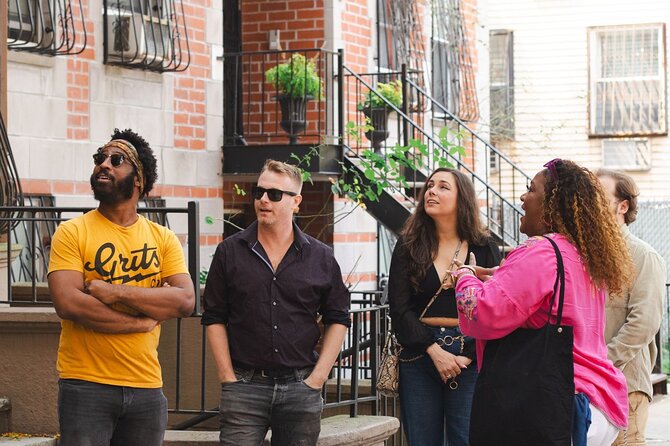
- The Soul of Harlem Walking Tour offers an immersive experience exploring Harlem’s rich cultural heritage, including the Harlem Renaissance, civil rights activism, and the Black Lives Matter movement.
- The tour highlights key historical sites such as the Apollo Theater, Abyssinian Baptist Church, and historic row houses that reflect Harlem’s architectural and spiritual legacy.
- Participants gain insights into the contributions of African-American artists, writers, musicians, and social activists who have left an indelible mark on American culture.
- The tour provides a deeper understanding of Harlem’s role as a hub for civil rights activism, with connections drawn to ongoing efforts for racial justice exemplified by the Black Lives Matter movement.
- Experienced tour guides share personal connections to the community and provide in-depth knowledge of Harlem’s vibrant history, guiding participants through the neighborhood’s dynamic cultural landscape.
Exploring Harlem’s Vibrant Cultural Landscape
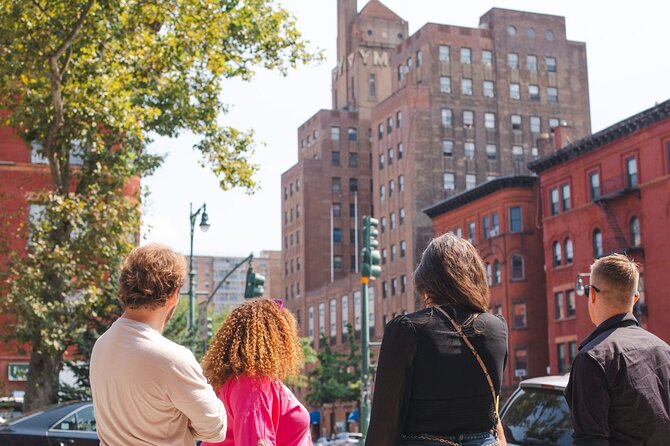
The Soul of Harlem Walking Tour immerses visitors in the vibrant cultural landscape of this historic New York neighborhood.
Travelers explore Harlem’s contributions to African-American art, literature, music, and social movements. Key sites include the iconic Apollo Theater, the Abyssinian Baptist Church, and historic row houses.
Guides share insights into the Harlem Renaissance, the civil rights movement, and the ongoing Black Lives Matter movement. Participants gain a deeper understanding of Harlem’s rich heritage and its enduring influence on American culture.
The tour offers a comprehensive yet engaging exploration of this dynamic community.
If you're enjoying exploring New York City on foot, you'll love these other walking tours we recommend
The Harlem Renaissance: A Literary and Artistic Movement
Harlem’s vibrant cultural landscape was epitomized by the Harlem Renaissance, a seminal literary and artistic movement that flourished in the 1920s.
This period saw an outpouring of creativity from African-American writers, musicians, and visual artists, who celebrated their heritage and challenged racial stereotypes.
Key figures of the Harlem Renaissance included:
- Langston Hughes, renowned poet and essayist
- Zora Neale Hurston, acclaimed novelist and anthropologist
- Duke Ellington, pioneering jazz composer and bandleader
- Aaron Douglas, pioneering modernist painter
The Harlem Renaissance left an indelible mark on American culture, paving the way for the civil rights movement and inspiring generations of Black artists and intellectuals.
Civil Rights Activism and the Struggle for Equality
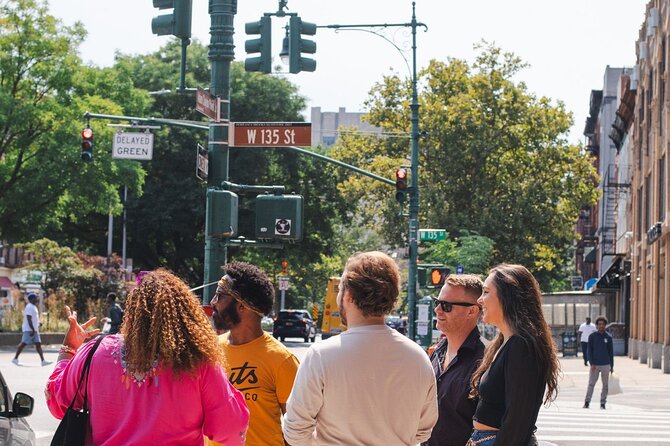
After the cultural renaissance of the 1920s, Harlem became a hub for civil rights activism, as African Americans continued their decades-long struggle for equality and justice.
The neighborhood witnessed key events in the civil rights movement, including rallies and protests led by figures like Malcolm X and Martin Luther King Jr.
Harlem’s churches, like the iconic Abyssinian Baptist Church, also played a pivotal role, serving as gathering places for organizing and mobilizing the community.
Today, the legacy of Harlem’s civil rights activism can be felt in the ongoing fight for racial justice, as exemplified by the Black Lives Matter movement.
The Enduring Legacy of the Black Lives Matter Movement
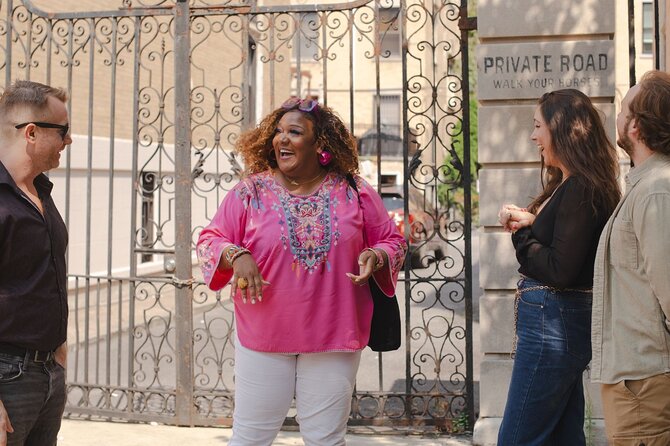
Although the Harlem Renaissance and civil rights activism of the past laid important groundwork, the Black Lives Matter movement has emerged as a powerful force, continuing the fight for racial equity and justice in Harlem and beyond.
The movement’s impact is seen through:
-
Organizing large-scale protests and marches to raise awareness of police brutality and systemic racism
-
Advocating for policy changes, such as demilitarizing law enforcement and reallocating funds to social services
-
Amplifying the voices of marginalized communities and centering the experiences of Black Americans
-
Inspiring a new generation of activists to carry on the struggle for racial justice
Discovering the Architectural Gems of Harlem
As visitors stroll through the historic streets of Harlem, they’ll be captivated by the striking architectural gems that dot the landscape.
From the iconic Apollo Theater to the grand Abyssinian Baptist Church, Harlem’s buildings showcase the neighborhood’s rich cultural heritage.
Ornate row houses and brownstones line the streets, reflecting the architectural styles that were popular during the Harlem Renaissance.
Travelers can marvel at the intricate details and diverse influences that have shaped Harlem’s built environment over time, gaining insights into the community’s evolution and resilience.
Fascinated by New York City's past? More historical tours we've covered
- American Museum of Natural History – Exclusive Guided Tour
- New York City Historic Walking Tour of Hamilton and Washington
- Christmas in New York: Private Holiday History Tour
- Speakeasy Pub and Prohibition History Tour NYC
- Private Tour New York City in the Gilded Age: A History of High Society
- The Speakeasy Adventure: A Tipsy Trip Through History
Taking in the Spiritual Traditions of Harlem
Visitors to Harlem can enjoy the neighborhood’s rich spiritual traditions, which have long been a cornerstone of the community.
The guided tour explores several significant religious sites, including:
-
The Abyssinian Baptist Church, a historic African-American congregation that played a vital role in the civil rights movement.
-
The Atlah World Missionary Church, known for its controversial political activism and outspoken pastor.
-
A local Pentecostal church, where visitors can experience the dynamic gospel music and worship services that have influenced global culture.
-
The Malcolm Shabazz Mosque, a hub of Islamic faith and community engagement in Harlem.
Experiencing the Sights, Sounds, and Flavors of Harlem
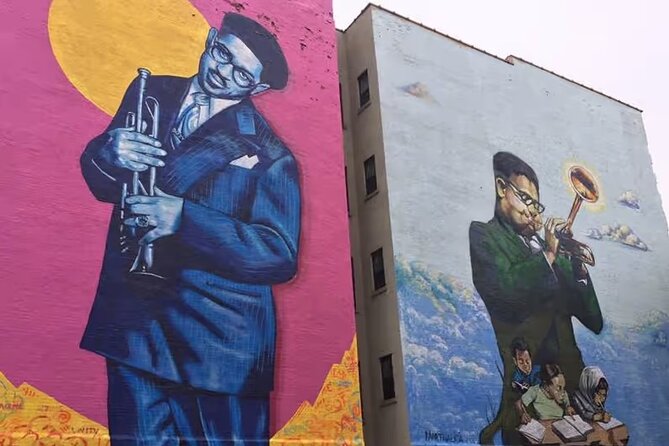
The Soul of Harlem Walking Tour not only immerses visitors in the neighborhood’s rich spiritual traditions, but also offers a multisensory experience of its vibrant sights, sounds, and flavors.
Guests explore iconic landmarks like the Apollo Theater, which has hosted legendary performers and continues to be a hub of African-American culture. They also visit historic row houses and hear the soulful melodies of gospel music drifting from local churches.
Throughout the tour, participants engage with Harlem’s thriving arts scene and sample the diverse cuisines that reflect the community’s heritage.
Connecting With Harlem’s Passionate and Knowledgeable Guides
Harlem’s passionate and knowledgeable tour guides are the heartbeat of the Soul of Harlem Walking Tour. They bring the neighborhood’s rich history and cultural legacy to life, engaging participants with their deep knowledge and personal connections.
The tour highlights include:
- Exploring key historical sites like the Apollo Theater and Abyssinian Baptist Church
- Delving into the Harlem Renaissance, civil rights, and Black Lives Matter movements
- Sharing personal anecdotes and insights from longtime Harlem residents
- Fostering an immersive experience that connects visitors to the soul of the community
Reviewers consistently praise the guides’ expertise and ability to create a meaningful, memorable tour.
Frequently Asked Questions
Is the Tour Suitable for Children Under 12?
The tour appears suitable for children under 12, as it’s wheelchair and stroller accessible, with a maximum group size of 18 travelers. However, the depth of information may be more engaging for older participants.
Can We Take Photographs During the Tour?
Yes, participants can take photographs during the tour. The tour company encourages guests to capture the sights and scenes of Harlem’s historic landmarks and cultural attractions to preserve their memories of the experience.
Are There Any Food or Drink Options Available?
The tour does not include any food or drink options. Participants can purchase refreshments at their own expense before or after the guided walk. Some reviews mention nearby cafes and restaurants, but the tour itself does not provide any food or beverages.
Do We Need to Bring Any Special Equipment?
Guests don’t need to bring any special equipment for the tour. The tour is wheelchair and stroller accessible, and service animals are allowed. Participants should wear comfortable walking shoes and dress for the weather.
Is the Tour Offered in Languages Other Than English?
The tour is offered in English only. According to the information provided, the guided walk is led by local Harlem residents and award-winning tour guides, suggesting the primary language used is English.
Recap
The Soul of Harlem History and Heritage Walking Tour offers a captivating journey through Harlem’s rich past, highlighting its pivotal role in the Harlem Renaissance and civil rights movements. Participants discover iconic sites, explore the neighborhood’s cultural and architectural gems, and enjoy the vibrant sights, sounds, and flavors that have made Harlem a legendary and enduring symbol of African-American resilience, creativity, and social justice.
More Walking Tours in New York City
- Brooklyn Christmas Lights Walking Tour at Dyker Heights
- Central Park 2hr Walking Tour Led by Expert Manhattan Residents !
- The Psychiatric History of New York Walking Tour
- Top Of The Rock and 3-hour Manhattan Walking Tour
- Lower Manhattan Historical Guided Walking Tour
- Complete Manhattan Walking Tour and Cycle Central Park
More Tours in New York City
- Superheroes in New York City Private Walking Tour
- NYC’s Greenwich Village Private Walking Tour
- Jewish History of NYC Private Tour With Transfers
- Statue of Liberty & Empire State Building 5-hour Tour by Car
- Brooklyn Bridge Running Tour
- Choose Your Access Statue of Liberty and Ellis Island Small-Group Tour
More Tour Reviews in New York City
Not for you? Here's more things to do in New York City we have recnetly reviewed
- 3 Best Craft Beer Tours And Tastings In New York City
- 16 Best 2 Day Tours In New York City
- 15 Best 3 Day Tours In New York City
- 25 Best Cruises And Boat Tours In New York City
- 20 Best Christmas Experiences In New York City
- 25 Best Dining Experiences In New York City
- 15 Best Full-Day Tours In New York City
- 25 Best Helicopter Flights And Tours In New York City
- 2 Best Jet-Ski Experiences In New York City
- 4 Best 4 Day Tours In New York City
- 3 Best Coffee Tours And Tastings In New York City
- 20 Best Photography Experiences In New York City
